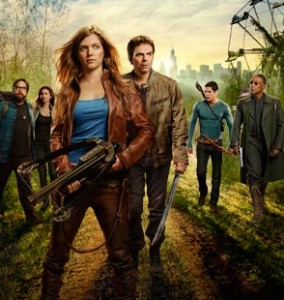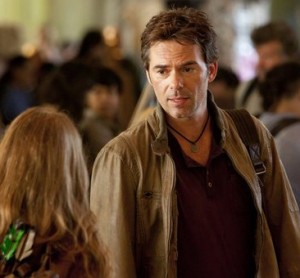Surprise, Surprise
 Good storytelling is something like telling a good joke. If it’s well told, you don’t mind hearing it again, now and then, but after about the fifth time, it starts to feel like an act of war. Human beings were never meant to be bored. If you’re being paid to entertain, you have an obligation to bring something new to the table.
Good storytelling is something like telling a good joke. If it’s well told, you don’t mind hearing it again, now and then, but after about the fifth time, it starts to feel like an act of war. Human beings were never meant to be bored. If you’re being paid to entertain, you have an obligation to bring something new to the table.
By jove, even journalists know that.
Now, at the outset, we haven’t all heard the same jokes, so our taste is a subjective thing, and I’m quite willing to admit I may have missed something very, very profound in the new NBC show “Revolution,” but after trying very hard to watch an episode and a half, I’m thinking the only thing remotely novel about the project was the premise: a world without electricity. Boom. Lights off. Start over. Oh my gosh, what would happen???
That’s just about the whole show. You got it right about there. Sure, with CGI and network budgets, you’ll get to see some planes fall out of the sky and some haunting urban skylines. If Roland Emmerich is the 80 proof single malt of cinematic Apocalypse you get a little wine spritzer here, and as I write that, I realize it’s a bit depressing to know that for some, film criticism stops right there: how good was the CGI? How good was the compositing? Well, to answer the question, um… it’s okay. It didn’t get in the way of my not enjoying the story, because that’s where the problem lies — no story. Story depends on surprise, because God made us all a little different, a little surprising, even the most boring among us.
The network version of God’s creation is a kind of uniformly beautiful, busty, bristling glamour, what Roald Dahl might have called “obscene good looks.” In life, good looking people are kind of a treasure because there are so many of us average people looking on. The network never trusts itself to make the cast look like life. (Now, I think you can have a really good looking cast, but they need something real to work on, like a real script, which Revolution doesn’t have, so I’m not going to make the actors pay the price for it. I don’t think Gary Oldman or Ralph Fiennes could have made this script look interesting.)
The story? Well, there’s the plucky teenage female heroine, heavy on the girl power, who can deliver a groin kick faster than a Navy SEAL. Introduce her to the post disaster world by having her wander in from a hunt, crossbow slung jauntily over her shoulder. She is also, of course, sullen and dismissive with her parents, because of course that’s never been done before in network television. In this case, there’s that never-explored-before reality of a step mother, a beautiful step mother with an English accent, who doubles as the village doctor. Super-girl’s brother is sickly and asthmatic, and — hey, that’s right! — there are no inhalers in this world, because there’s no electricity to make them!
 Every post-apocalypse show needs some deeply remote, hard to find William Wallace figure whose native charisma and fighting skills can rouse the peasants to a series of victories over the evil vestiges of the military-industrial complex who now rule the world. I figured it would take at least four episodes to find this guy in Revolution, complete with an improbable journey across miles of charred wilderness, but, no, hey, the guy is only two scenes away, in a burnt out Chicago, and it’s not even Mel Gibson. It’s Billy Burke, who looks about as dangerous as a municipal golf pro lounging in a fern bar — except, of course, it’s NOT a fern bar because there is no electricity, and he has to, like, make his own booze in an improvised still! And he’s drunk, of course, and cynical about putting up any sort of fight, because that’s NEVER been done before. Don’t you get it? He’s dangerous because he’s, like, so casual and nihilistic. That’s the twist, man. He can fight off twenty dusty, mad-max ninjas, all of them with more firepower than he has, by himself, because he’s like so checked-out and ready to die, because, well, he doesn’t believe in war anymore. That’s the cosmic part, dude.
Every post-apocalypse show needs some deeply remote, hard to find William Wallace figure whose native charisma and fighting skills can rouse the peasants to a series of victories over the evil vestiges of the military-industrial complex who now rule the world. I figured it would take at least four episodes to find this guy in Revolution, complete with an improbable journey across miles of charred wilderness, but, no, hey, the guy is only two scenes away, in a burnt out Chicago, and it’s not even Mel Gibson. It’s Billy Burke, who looks about as dangerous as a municipal golf pro lounging in a fern bar — except, of course, it’s NOT a fern bar because there is no electricity, and he has to, like, make his own booze in an improvised still! And he’s drunk, of course, and cynical about putting up any sort of fight, because that’s NEVER been done before. Don’t you get it? He’s dangerous because he’s, like, so casual and nihilistic. That’s the twist, man. He can fight off twenty dusty, mad-max ninjas, all of them with more firepower than he has, by himself, because he’s like so checked-out and ready to die, because, well, he doesn’t believe in war anymore. That’s the cosmic part, dude.
Well, okay, the point is that it’s really, really awful; it’s about as bad as you can do on a multi-million dollar budget. I note that lots of young fans are writing reviews comparing this unfavorably to Walking Dead, and the comparison is instructive. Walking Dead, whatever its failings, surprises you. Some of the surprise, to be certain, depends on, say, the sort of alarm you feel watching a severed, necrotic head, still alive, and working its way across the park by its teeth, but that is, at least, new. You haven’t seen that before. Not so with NBC’s “Revolution.” You’ve seen everything, literally everything, several hundred times before.
Plodding away in the happy loam of period drama, as I am, turning up the earth to nurture new strains of Indian corn, waiting to pull back the husk and show the world some new little mosaic of beaded burgundy, some new, small twist on the human condition, I hear Netflix on the big screen, up in the living room, above the orchard, and the thought of network executives turning over millions of dollars to abject idiots — well, I have to admit, it’s a tad depressing.
